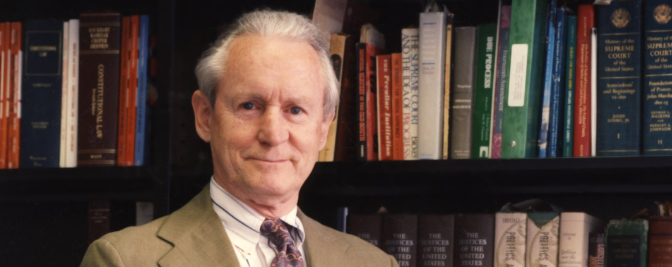Another Member of the Greatest Generation Has Died
John J. Gibbons was born in Newark, and worked here for decades as lawyer, judge,
and law professor. His name graces the Newark skyline in a tribute both fitting and
ironic: fitting for his long and deep dedication to the city, and ironic for such
a quiet, humble man. In the 1950’s, he began working for the firm that now bears his
name. In the 1960’s, he organized attorneys to help those unable to afford legal representation
during the Newark riots and served on the commission investigating the causes of those
riots. In the 1970’s and 1980’s, he served as a United States Circuit Judge with his
chambers in Newark. In the 1990’s, he rejoined his Newark law firm and created the
John J. Gibbons Fellowship in Public Interest and Constitutional Law, which in the
decades since has done a wide range of important pro bono work.
It is impossible to overstate his impact on Seton Hall University School of Law. Current
students know the Gibbons name from the Gibbons Institute of Law, Science & Technology, as well as the Gibbons Moot Court Competition. But they may not know that Judge
Gibbons was a founding member of the law school faculty in the 1950’s or that he taught
constitutional law and federal courts to generations of students while continuing
to practice law and later sit on the circuit bench. After his retirement from the
Third Circuit in 1990, he joined the Seton Hall Law faculty full time. Several current
members of the faculty owe their academic careers to him, having served either as
his law clerk or as a Gibbons Fellow before joining the law school faculty.
His scholarly writing continues to be read and taught: his law review article on the
history of the Eleventh Amendment to the constitution, published in the Columbia Law
Review in 1983, remains the most important work on the topic. To this day, it is
discussed in federal courts classes across the country, including the one taught by
the dean of Harvard Law School.
The breadth of his career is perhaps best illustrated by the way it twice connected
to Guantanamo Bay, Cuba. During World War II, he was stationed there as a member of
the United States Navy. Some sixty years later, he argued before the Supreme Court
of the United States on behalf of those detained at Guantanamo.
As Dean Boozang said, “Judge Gibbons transformed the lives of countless clients, people
who benefited from his opinions and public interest work, and hundreds of students,
faculty, and colleagues.”
Judge Gibbons was a man of deep faith and powerful intellect. His example taught us
that these are not merely compatible but complementary. We may never see his like
again, but he will continue to inspire us.






